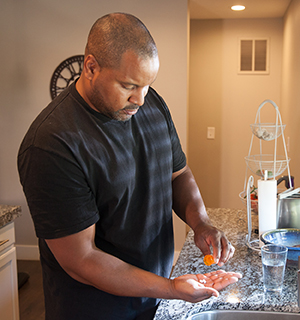A
B
C
D
E
F
G
H
I
J
K
L
M
N
O
P
Q
R
S
T
U
V
W
X
Y
Z
Click a letter to see a list of medical procedures beginning with that letter.
Click 'Back to Intro' to return to the beginning of this section.
Treating Epididymitis and Orchitis
You have inflammation of the epididymis (epididymitis) and testicle (orchitis). This is likely from an infection. In some cases, epididymitis and orchitis occur along with urinary tract infections. Treatment includes medicine to get rid of the infection. It also includes medicine and other methods to ease symptoms.

Possible treatments
-
Antibiotics. Acute epididymitis is most often treated with oral antibiotics. You may also be given a shot (injection) of antibiotics. Be sure to take all of your medicine until it is gone, even if you feel better.
-
Anti-inflammatories. You may be prescribed medicine to reduce swelling and tenderness.
-
Rest. You will most likely need to rest for 3 to 4 days until swelling and fever are gone. When you are able, lie down with a towel folded under the scrotum to raise it slightly. This can help ease mild pain.
-
Scrotal support. If your testicles are swollen, wear an athletic supporter (jockstrap) or spandex shorts. This may help control swelling and ease symptoms.
-
Ice and heat. To ease swelling, use an ice pack wrapped in a thin towel on the scrotum. Once swelling is gone, sit in a warm bath to increase blood flow to the area. To make an ice pack, put ice in a plastic bag that seals at the top. Wrap the bag in a clean, thin towel. Never put an ice pack directly on the skin.
After treatment
The inflammation will go away with treatment. But you may have an achy feeling in the testicles for 2 to 4 weeks. This does not mean the infection has come back. The testicles just take time to heal. But if you feel a lump in a testicle after treatment, see your healthcare provider. Once the inflammation is gone, you can be active again.
Transmission of infection
If you are sexually active, your sex partner needs to see a healthcare provider as well. This is because sex can sometimes spread the infection that causes this condition. If the infection is from an STI (sexually transmitted infection), the infection will likely spread through sexual contact. You should not have sex until the symptoms are gone, the antibiotics are finished, and your partner has been evaluated by a doctor and also treated. If the infection is from bacteria in the urinary tract, you are less likely to pass it on to someone else.
Online Medical Reviewer:
Chelsey Schilling BSN RN
Online Medical Reviewer:
Melinda Murray Ratini DO
Online Medical Reviewer:
Raymond Turley Jr PA-C
Date Last Reviewed:
9/1/2025
© 2000-2026 The StayWell Company, LLC. All rights reserved. This information is not intended as a substitute for professional medical care. Always follow your healthcare professional's instructions.